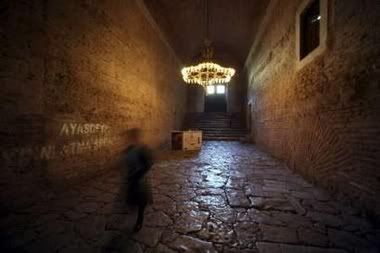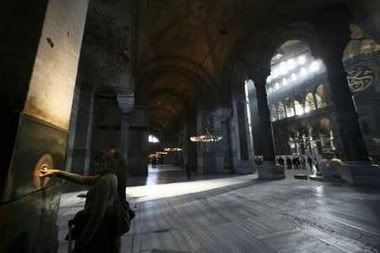[Unedited except for some line breaks. Veracity is unknown.]
The Revd Thomas Mozely, the Times Special Correspondent in Rome in 1870 records the Definition of the Dogma of Papal Infallability took place during a violent thunderstorm. One hesitates to predict the weather for the forthcoming visit of the Archbishop but if he denies Papal infallibility to the Pope’s face, I forecast a chill wind.
Here is his account.
The reading of the Dogma was followed by the roll-call of the Fathers, and Placet after Placet (vote of agreement) followed, though not in very quick succession. (in fact, 533 votes for, two against, one of the two going to the throne immediately afterwards with the words, "Modo Credo, sancta Pater – now I believe Holy Father." Many French bishops had already left - my added comment). They were uttered in louder and bolder tones than on former occasions, either that the echo was greater from the comparative emptiness of the church or that the Fathers were pleased at being shorn, and amid their utterances there was a loud peal of thunder.
The storm, which had been threatening all the morning, burst now with the utmost violence, and to many a superstitious mind might have conveyed the idea that it was the expression of Divine wrath, as ' no doubt it will be interpreted by numbers,' said one officer of the Palatine Guard. And so the Placets of the Fathers struggled through the storm, while the thunder pealed above and the lightning flashed in at every window and down through the dome and every smaller cupola, dividing if not absorbing the attention of the crowd. Placet, shouted his Eminence or his Grace, and a loud clap of thunder followed in response, and then the lightning darted about the baldacchino and every part of the church and Conciliar Hall, as if announcing the response. So it continued for nearly one hour and a half, during which time the roll was being called, and a more effective scene I never witnessed. Had all the decorators and all the getters-up of ceremonies in Rome been employed, nothing approaching to the solemn splendour of that storm could have been prepared, and never will those who saw it and felt it forget the promulgation of the first Dogma of the Church.
The facade of the Hall had not been removed as on former occasions, only the great door was opened, so that it could be scarcely called an open Session, and people could get a glimpse of what was going on only by struggling fiercely and peering over one another's shoulders, or by standing at a distance and looking through a glass. I chose this last and better part. The .storm was at its height when the result of the voting was taken up to the Pope, and the darkness was so thick that a huge taper was necessarily brought and placed by his side as he read the words which invested him with Divine powers, ' Nosque, sacro approbante Concilio, ilia ita decernimus, statuimus atque sancimus ut lecta sunt, definimus et apostolica auctoritate confirmamus' And again the lightning flickered around the Hall, and the thunder pealed.
I was standing at this moment in the south transept trying to penetrate the darkness which surrounded the Pope, when the sound as of a mighty rushing something, I could not tell what, caused me to start violently, and look about me and above me. It might be a storm of hail. Such for an instant was my impression ; and it grew and swelled, and then the whole mystery was revealed by a cloud of white handkerchiefs waving before me. The signal had been given by the Fathers themselves with clapping of hands. This was my imaginary hailstorm ; and it was taken up by the crowd outside the Hall and so the storm grew in violence until at length it came to where I stood. Viva il Papa Infallibile! Viva il trionfo dei Cattolici!


